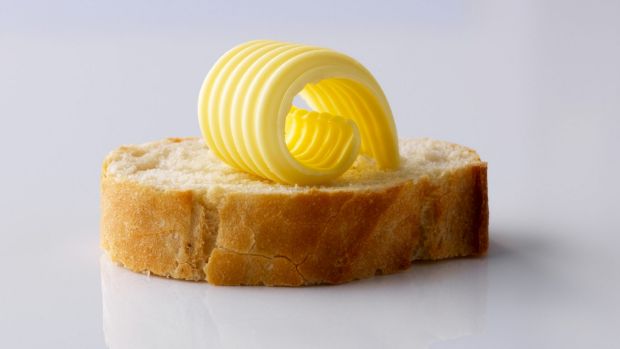
Butter is back.
Here’s the latest news from the health police: butter is officially back. Scientists have reviewed the evidence that saw saturated fats demonised in the early Eighties, and have concluded that original warnings were based on flawed data: that deliciously salty, creamy, yellowy taste of childhood is once more allowed on our plates.
Yesterday’s report, published in the BMJ’s Open Heart journal, found that women were excluded altogether from the data set on which the recommendation to eat less saturated fat was based – as were healthy men. Meaning that the research was, in scientific terms, meaningless. So we can ditch with impunity that ghastly bland, slimy, insipid marge – pumped full of God knows what chemicals – in favour of some scrumptious Anchor or Lurpak.
Actually, in my house, butter has long been in fashion. That was due to a chance conversation with Raymond Blanc in 2001, who solemnly castigated me for eating anything else. He pointed out that using the best, most natural, least processed ingredients possible just had to make better sense. I can remember going home and ditching the low-fat spreads with genuine relief. And to be fair, his theory has worked so far: while bowing to no one in my love of dairy produce, I also test consistently low on the cholesterol scale.
But even while we all rush to toast a quick crumpet in celebration, I have to say this latest reverse ferret from our nutritional overlords does bring with it a sense of exhausting deja vu. Because butter will almost certainly be banned again at some point, just like eggs were back in the Eighties, when eating more than two a week was linked to high cholesterol.
Of course, we’re used to the see-sawing of public health opinion about different foods. We all watched as red wine moved from good to bad and back again. We’ve crunched the numbers when we were told to double the five-a-day of fruit and veg to 10.
The debate about butter, however, is actually part of a wider war – over cholesterol itself. This waxy little substance is arguably the most hotly debated molecular structure in our bodies, due to its connection to the ??25 billion industry in taking statins.
Put simply, if cholesterol (and butter) is bad, and causes heart disease, then it’s down the hatch with the statins in an effort to keep our arteries fur-free. But if it isn’t, then why should we take the things in the first place?
More than seven million Britons now take a nightly statin in an attempt to ward off strokes and heart attacks. Yet their true usefulness is persistently challenged, with critics ranging from GPs to cardiologists and pharmacologists warning that the main tranche of research on which statin use was recommended is flawed. Malcolm McKendrick, a Macclesfield GP and author of The Great Cholesterol Con, has pointed out repeatedly that for the vast majority of people, taking a statin will have zero impact on their life expectancy. “There have not been any trials carried out in the elderly,” he insists, “and there is no evidence any women will benefit from taking them.”
Caught in the middle, which way do we mere consumers jump? Perhaps we have to apply belt and braces – wash down tonight’s Lipotor with a glass of buttered milk.
Obviously, I am grateful that there are dieticians and food chemists, biomedical researchers and epidemiologists out there who have taken up the cudgels of public health. I certainly wouldn’t have the patience to test the calories in a carrot.
But we should question a little harder where some researchers get their funding from for these see-sawing studies. Quite a few are produced thanks to funds from drugs and food corporations (what you might call Big Pharma and Big Farmer). And so often the research produced seems to be aimed less at protecting our health and more at finding new reasons why we should buy their wares – whether it’s margarine or butter, sugar or sweetener, fruit juice or fruit cocktail.
Really, though, I’m just sick of being told what’s good for me and what isn’t when there’s no consistency to the message. Because all of us could devise a fairly healthy national diet without spending so much as a chocolate coin on clinical trials.
Were I queen for a day, my nutritional orders would be for the nation to eat thoughtfully, three times a day, with lots of fruit and veg, very little junk, and everything else in moderation.
Not only is that a diet plan we could all afford, but it would be a piece of cake to follow.
The Telegraph, London
